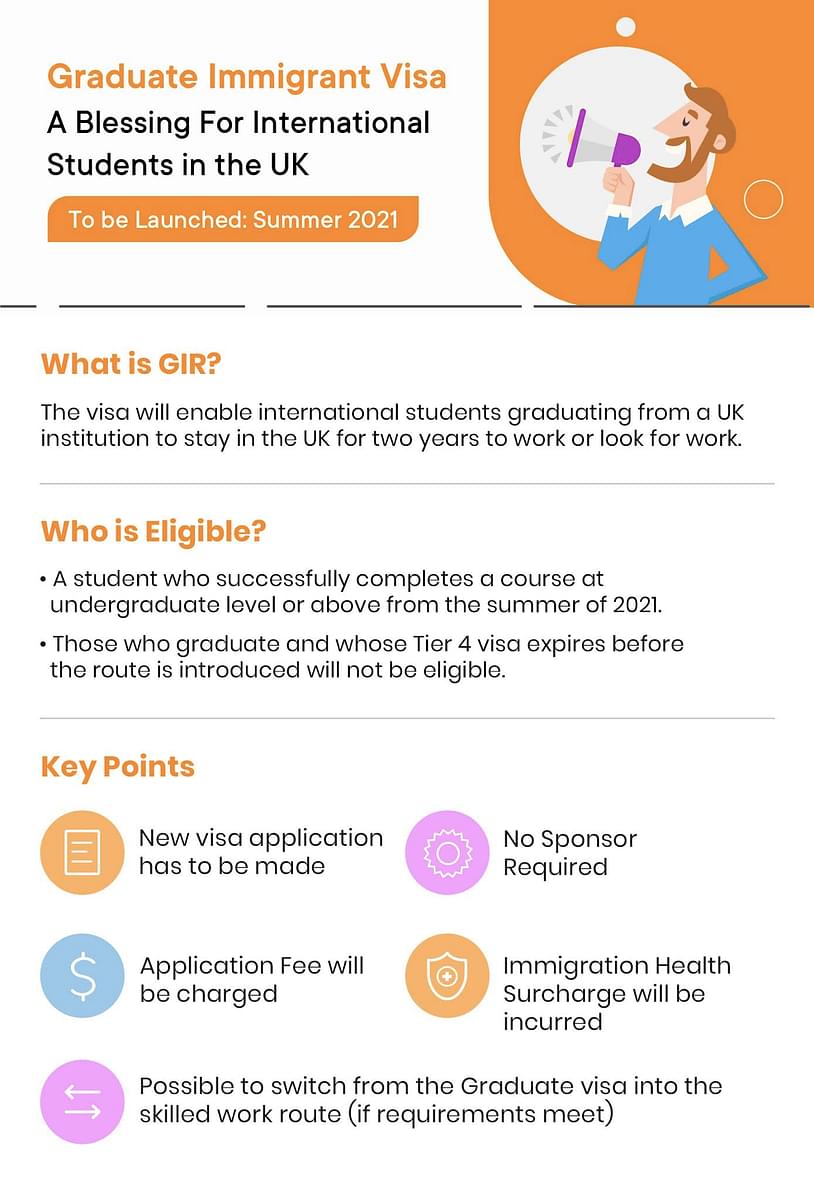As of June 2019, the UK government has issued a Tier-4 study visa to more than 250,000 students seeking degrees in the top-notch institutions of the UK. To sustain the academic diversity and global competitiveness of these institutions, issuance of the Graduate Immigration Route seems to be a promising step.
Let’s learn how!
What is a Graduate Immigration Route?
The Graduate Immigration Route is a pathway for all international students to transit into working professionals after graduating from a UK-based institution. Any student with a tier-4 student visa who has successfully completed his degree will be eligible to avail the benefits of the Graduate Immigration Route (GIR). The GIR allow them to stay back in the UK and look for job opportunities and work for up to 2 years.
The GIR will come into effect in summer 2021. Any undergraduate or postgraduate student graduating from a registered UK university in the year 2021 and beyond is eligible to apply for GIR.

What benefits does the Graduate Immigration Route Offer?
Along with academic accomplishments, students look for valuable opportunities in terms of professional experience. While many students take up internships in their winter and summer breaks, pursuing a full-time job obviously helps in gaining extra brownie points.
More so, in the case of Indian students who are pursuing education abroad, gaining post-study work experience is highly essential.
So, with the introduction of the new Graduate Immigration Route (GIR), the Government of UK has opened doors for Indian students by allowing them to stay back in the UK for up to two years to on graduating from a UK institution.
Who are eligible for the Graduate Immigration Route?
Notwithstanding the excitement on GIR, it is crucial to understand the various guidelines laid down to obtain this route.
It has to be noted that a tier 4 student visa will not automatically convert into a GIR. Students will have to apply for GIR separately. The application process for GIR can only be completed while staying in the UK. The application is chargeable and has to be submitted using a new form. Additionally, applicants will have to pay for the Immigration Health Surcharge. The exact cost of the fees will be disclosed in due course.
Applicants will be subject to criminality, identity and security checks. Those applying to stay in the UK via the GIR must be in line with the Home Office’s immigration rules. Students can check the status of universities before applying for GIR as graduates from only registered universities will be eligible to apply for GIR. Further information on this can be obtained from the Government of UK website.
Can a GIR be Converted to a Work Visa?
It has to be noted that while the GIR allows graduates to stay and look for work in the UK for up to two years, it will not be considered as a work visa by any means. Graduates who are staying in the UK under the GIR and who are successful in securing a job in the UK can switch to a skilled-work visa.
The GIR is a gateway for Indian students to gain meaningful experience in a globalised economy like the UK. The Indian market has opened to global brands and businesses in the last few decades and two years of international exposure can provide further impetus to Indian students in starting a global-facing business or landing a coveted job opportunity at a reputed MNC. The UK not only offers academic excellence but also gives you a great return on investment as students will be able to stay and work for two years in the UK. Students will be able to convert their academic skills into practice when they learn from the best in their industry and benefit from what the UK has to offer to the world.
For further information, check - https://www.britishcouncil.in/study-uk


![University College London [Ucl London]](https://static.zollege.in/public/college_data/images/studyabroad/logos/college_846_16-12:41_university-college-london.jpeg?tr=w-50,h-50,c-force?tr=h-40,w-35,c-force)

![University of Edinburgh [ED]](https://static.zollege.in/public/college_data/images/studyabroad/logos/college_810_07-11:27_logo.png?tr=w-50,h-50,c-force?tr=h-40,w-35,c-force)
![King's College London [Kcl]](https://static.zollege.in/public/college_data/images/studyabroad/logos/college_836_07-11:35_logo.png?tr=w-50,h-50,c-force?tr=h-40,w-35,c-force)











